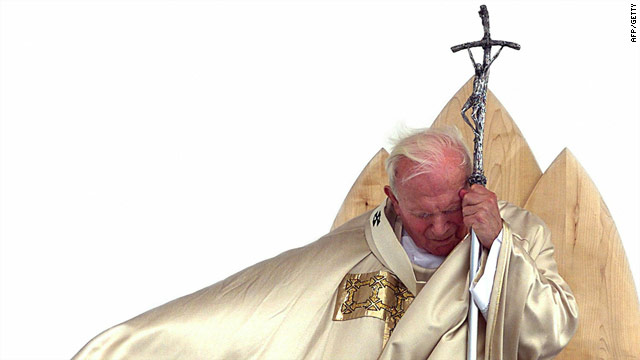 Pope John Paul II in a file photo By Dan Gilgoff, CNN Belief Blog Co-Editor Pope John Paul II is in the news today in a big way, with the Vatican announcing he will be beatified in May - the last step before sainthood. Most people know that John Paul was hugely important - one of the most consequential popes in history - without exactly knowing why. Here are 9 reasons: 1. John Paul II turned the role of pontiff into global celebrity. "He was the first pop pope," says Stephen Prothero, a Boston University religion professor and CNN Belief Blog contributor. "Although rather conservative theologically he was the first to marry the papacy to the cult of celebrity." 2. He made people rethink the Catholic Church, updating its image and strengthening its influence with everyday people and world leaders alike, through a vigorous campaign of global engagement. "For the most part popes had been viewed as old Italian guys in white sitting on some gilded baroque throne in Rome," says David Gibson, who has authored multiple books on the papacy. "But in demonstrating a willingness to think and act outside the papal box, John Paul inspired many Catholics and, just as important, he made billions of others look at the Catholic Church in a new way." "John Paul II embodied in change in so many ways," Gibson says, "that he seemed to signal to the world that the Catholic Church could be as agile as any institution in the modern world." 3. He left Rome. A lot. John Paul II was the first globetrotting pope, drawing huge crowds in corners of the world that no pope had ever visited. "He broke out of the golden cage of the Vatican and its protocols and took the papacy to the world rather than expecting the world to follow the road to Rome," says Gibson. And people responded. When John Paul II celebrated mass at Grant Park in Chicago - a city no pope had visited before – in 1979, 1.2 million people showed up. 4. He helped end Communism. A year after his election to the papacy, John Paul returned to his native Poland to "strengthen the brethren" there in the face of Soviet rule. His visit, in which he repeatedly told Poles "Don't be Afraid," helped inspire the launch of the Solidarity in Poland, the most powerful anti-communist movement until that time, which in turn triggered similar resistance across the Soviet Union. When Communism collapsed in 1989, many credited John Paul with helping lay the groundwork. 5. He was one of the world's great communicators. Fluent in 8 languages, the John Paul II often addressed audiences in their native tongue. "He spoke everyone else’s language, and his Latin wasn’t so great," says Gibson. And he wasn't shy about using the media to get his message out. 'If it doesn’t happen on TV, it doesn’t happen,” John Paul used to say, according to Gibson. And he was even more effective in person. "Almost everyone who ever met him describes it exactly the same way, that when he was speaking with you, it was as if you were the only person in the world," says Joseph Zwilling, who directs communications for the Catholic Archdiocese of New York. "He saw in every person a real reflection of the image and likeness of God, and lived that out in a radical way." Even when he was suffering from Parkinson's late in life, Pope John Paul was unafraid to be seen. "His willingness to appear in public bearing the effects of Parkinson's reminded the world that for the Christian, suffering is nothing to be ashamed of, or hidden away," says James Martin, a Jesuit writer. 6. More than previous popes, he inspired young people, the lifeblood of any religious tradition. John Paul II "logged hundreds of thousands of miles in tours that brought vast crowds of adoring adolescents," says Prothero. Adds Tom McClusky, director of government relations for the conservative Family Research Council in Washington: "He empowered youth throughout the world to make holiness a part of their lives." 7. While revolutionizing the papacy, he strictly adhered to traditional church teaching. "Change is often seen as a dirty word in the church, as though altering the smallest custom or tradition would start a crack in the entire edifice of faith," says Gibson. But John Paul reaffirmed the church's conservative stances on social issues like abortion and contraception, signaling a change of course after what some saw as the more liberal reforms of the Second Vatican Council. "He ended the dominance of liberation theology... revivified the grandeur of traditional Catholic liturgy, and he reconnected Catholic social teaching to the witness of scripture," says Deal W. Hudson president of Catholic Advocate. "John Paul II energized the 'evangelical' wing of the Catholic Church, meaning Catholics who embrace church teaching and want to take it to the streets to change the culture, which in the United States you see most clearly on the 'life issues' such as abortion and gay marriage," adds John Allen, Jr. CNN's Vatican analyst. "There’s now a whole generation of younger 'John Paul II' priests and bishops who share that mindset. 8. John Paul reset Catholic relations with other religious traditions. He was the first pope to visit a synagogue and a mosque. "Many Jews think of him as the greatest pope in history," says Allen. "He also managed to pioneer better relations with Islam - two pretty remarkable things to have accomplished at the same time." He also improved Catholicism's relationship with other Christian traditions. "John Paul II won an unprecedented level of respect for the Catholic Church among evangelical Christians, removing the anti-Catholic tinge of much of their preaching, teaching, and cultural commentary," says Hudson. 9. He de-Italianized the papacy, the first pope born outside of Italy in centuries. | |
Saturday, January 15, 2011
9 Reasons Pope John Paul II mattered
Subscribe to:
Post Comments (Atom)
No comments:
Post a Comment